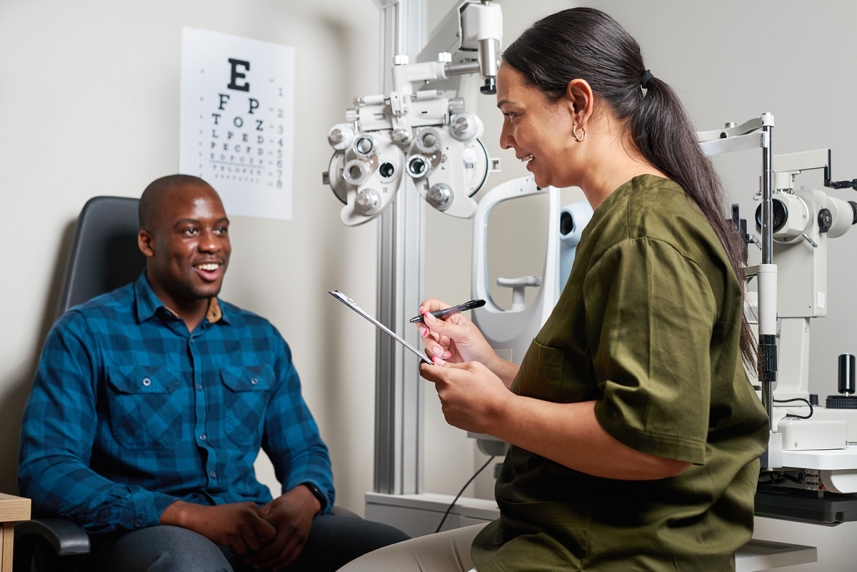How a person can choose the right LASIK surgeon
Interested in this type of corrective eye surgery? It’s important to find the right eye care provider to do the job.

If a person is interested in getting any type of surgery, it’s important to find a surgeon they trust to do the job, so they can be comfortable with their choice and know what to expect.
That can be especially true if a person is getting LASIK eye surgery, or laser vision correction surgery. (LASIK stands for laser-assisted in situ keratomileusis.)
LASIK is popular because it might help prevent the need to wear glasses or contact lenses again. It may be best for people who are:1
- Nearsighted (myopia), or when objects far away may appear blurry.
- Farsighted (hyperopia), or when objects up close may appear blurry.
- Have an astigmatism, or when either near or distant vision may appear blurry.
During the procedure, an eye care provider will reshape the cornea. The result allows light entering the eye to better focus on the retina for clearer vision. (The cornea is the clear, dome-shaped outer layer of the eye, while the retina is the light-sensitive back.)
Choosing the right eye surgeon can be crucial to ensure the best results. It may also minimize risks. Learn how a person can pick the right LASIK surgeon below.
Ready to ditch your glasses or contacts for good? Get more info on LASIK surgery today.
Why might it be important to find the right surgeon for LASIK surgery?
The success of LASIK surgery may largely depend on the expertise of the surgeon.2 A skilled and experienced surgeon can increase the likelihood that a person may have a successful outcome. Their expertise may also reduce the potential for issues after surgery.
It can be vital for a person to research and select a surgeon. They might want to find someone who is not only qualified, but also has a proven track record. Here might be some ways to measure the best LASIK surgeons:
1. Their experience and credentials. When choosing a LASIK surgeon, the first factors to consider could be their experience and credentials. A surgeon who has performed thousands of LASIK surgeries may have better skills compared to someone who has done only a few.
It may also be important to check if the surgeon is board-certified in ophthalmology and has specific training in laser eye surgery. (That means they’re a medical doctor who can treat eye and vision issues, as well as perform eye surgery.)
They may also have credentials from top medical institutions and/or be active members of professional organizations like the American Academy of Ophthalmology. That may also be an indicator of a LASIK surgeon’s commitment to maintaining high standards in their practice.
2. The types of technology they use. Different surgeons might have access to more advanced equipment. Some of the latest technologies may include:
- Wavefront-guided LASIK. This uses precise measurements of how light travels through a person’s eye to guide the laser treatment.3
- Femtosecond lasers. These create a thin flap in the cornea with rapid, ultra-short pulses.4
A person may want to ask about the tech a surgeon has access to before they get LASIK surgery. They may also want to check whether it’s the most current and suitable for their specific vision correction needs.
3. Their level of honesty. If an eye surgeon tells a person they will have 20/20 vision and never need glasses or contact lenses again, that may be a red flag. LASIK surgery may not be a guarantee of perfect vision or a chance to ditch eyewear for good.2
Why putting in the legwork to research surgeons may be valuable
Researching potential surgeons can be crucial. A person may not be able to figure out any of the above points without doing it. That could be as easy as:
- Asking for recommendations from friends or family who have undergone LASIK
- Checking the surgeon’s standing with state and local medical boards
- Reading reviews of the surgeon online
A person may want to look for positive feedback and testimonials. They may also want to check a surgeon’s ability to handle issues or provide follow-up care.
For example, if a testimonial says that a patient had an issue, might it also say that they got the care they needed, when they needed it?
What might be the value of a personal consultation?
One great option could be to do a personal consultation. That way, a person may:
- Meet the eye surgeon in person and see if they’re a good fit
- Ask them questions about the surgery and results
- Get a feel for the office, staff and potential tech that may be used
During this consultation, the surgeon may evaluate the person’s suitability for LASIK. They may also discuss potential outcomes, recovery time and risks.
UnitedHealthcare Vision offers a free exam through QualSight LASIK. That can be a valuable opportunity to figure out whether LASIK may be the right choice. UnitedHealthcare Vision members also save 35% on their LASIK procedure through QualSight LASIK.
Bottom line: Choosing the right LASIK surgeon may be a decision that a person will want to make before getting surgery. By taking the time to research and select a qualified surgeon, a person can greatly improve their chances of a successful surgery and an overall satisfying experience.
Sources:
- LASIK eye surgery National Library of Medicine: Medline Plus, last reviewed January 2024.
- How to find the right LASIK surgeon Harvard Health Publishing Harvard Medical School, October 2023
- Wavefront-LASIK (Custom LASIK) Stanford Medicine Health Care
- Invention to Impact: The story of LASIK eye surgery U.S. National Science Foundation, March 2024


